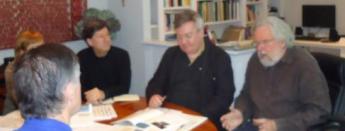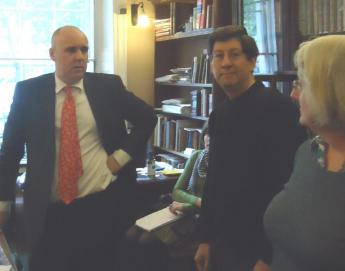Antiquarian Booksellers' Association Ash Rare Books
London Rare Books School 2013

By Laurence Worms
A couple of appearances for me on the maps course last week, but a full-time commitment to the Modern First Editions course this week. Booksellers generally love talking, of course – especially about books (and even more about themselves) – so it’s been an excellent week.
A delightful if very mixed group of students. The course well under way on Monday with a discursive session on the history and background of collecting modern books, the intellectual rationale of collecting, the nuances of textual transmission, the meaning of ‘modern’ in this context and the first appearance of author-collecting guides.
“The craze for first editions is not by any means a recent one, although it may be said to have now reached its extremest form of childishness” – written not, as you might suppose, last week, but in fact in 1894.
Toss in a little bit of analysis of how well predictions of who and what to collect have fared over the last century and something on the collecting frenzy of the 1920s. Then something on crooks in the market – and the opportunists and speculators too. On to more recent times, the rise and rise of the dust-jacket, and some modern rarities. And what actually are bibliographies for? At that point I produce the tightly-wrapped ‘mystery’ books that the students have to research over the course of the week.
After tea, I hand over to Angus O’Neill (Omega Bookshop) who skilfully rehearses the class through all the opacities of edition, impression, printings, reprints, issues, states, variants, remainder bindings and whatever else. The course is very much a joint effort and I couldn’t manage it without him.
Tuesday begins with the art of cataloguing and what descriptions of books mean, intend to mean, don’t mean or intend not to mean. What descriptions of condition should and should not mean. We try to decipher different descriptions of the same book on the internet. The trumpeting of some ‘points’ on certain books, the discreet and ominous silence on others. “Why would a bookseller not have the proper bibliography?” – the best question that has come up so far. And then the whole plethora of different ways of buying, selling and pricing books.
Full session on the evolution, history and importance of dust-jackets – the landscape of that wholly changed by the recent work of G. Thomas Tanselle and Mark Godburn. A look at the work of the great jacket designers. Who exactly was Bip Pares? (some unpublished research on her).
Angus comes in for the second afternoon and between us we conduct some case studies – what’s this book and what’s it worth. We’ve both brought in some pretty unusual titles – books that don’t look up – or books that do, but the evidence is wholly confusing. The students don’t appear to want this session to end – the questions keep coming.
Yesterday morning opened with Angus deconstructing the sorts and conditions of rarity, scarcity and collectability (with some odd and personal examples) – the books that are always rare, those that are rare one minute and not the next, the books that should be rare and aren’t, the books which should be common and aren’t – and the desiderata of desiderata.
Time for our first outing – a trip across town to pay our respects to one of the titans of the trade. One of the students murmurs that she has looked him up on the net – “He’s actually quite famous, isn’t he”? You bet – this is something like the book-trade equivalent of an audience with the Pope. Rick Gekoski is in fine form – taking us behind the scenes at that recent and so successful charity auction of annotated books in which he was so instrumental. The vagaries of the auction-room. And above all his theme for this year of ‘interrogating the data’ – the making sense of imperfect pricing and predictive information when faced with the unique and the truly rare. The class hangs on his every word. This is straight from the top table. A command performance for us always – thank you, Rick.
Back to Senate House and a raid on the treasures of the library there – David Chambers (no-one better in all the world) takes the afternoon session on the history of the private press. The very finest printing of the modern era all laid out in a little room. It’s almost like an incantation.
Today opens with Angus again – it’s time to confess. He casts his for once strangely unbenevolent eye over the murky world of the faker, the forger, the switcher, the eraser, the over-restorer and the general all-round slippery customer. Rich fare for just after breakfast.
Another outing – this time to the hallowed ground and the sacred portals of Maggs Brothers in Berkeley Square. Sedate and sober the exterior, but his is a modern first editions course after all. Within Carl Williams is going to slap up us in the face with his eye-watering collection of Counterculture – beat, subversion, extremism, psychedelia, the errant, the proscribed, the concrete, the macabre, the occult, the primitive, the surreal, the marginal, punk, po-mo and the absurd, Timothy Leary, Guy Debord, Black Panthers, Alex Trocchi, William Burroughs, Living Theatre, Aleister Crowley, Austin Osman Spare, the Sex Pistols, Derrida, R. D. Laing, Artaud, oh – and Lord knows what else – or in other words, the detritus of the student flats of my youth. Most of us threw it all away as we became sober citizens – a bad and a wrong thing to do, evidently.
I have a vague fear that he will one day come across some avant-garde magazine of the period with a particularly pretentious piece in it written by me in a previous incarnation. I was briefly the literary editor of some such thing in the long ago, although as far as I can recall this consisted mainly in going out drinking with minor poets of the post-war years, hoping they might have one last hurrah left in them. One of them had become a book-dealer on the back of selling a particularly pleasant series of rejection letters he’d been sent by T. S. Eliot, who didn’t wholly agree with Hugh MacDiarmid’s assessment of his poems. A shame, because if Faber had published him he would probably still be remembered – he was a real poet and told some very fine stories of nights out in Fitzrovia with Dylan Thomas to prove it.
Carl in excellent form – adding real intellect and contextual depth to the material – making us look at it with fresh eyes – once more the hanging-on-every-word thing develops. Thank you, Carl.
Having thus softened the class up – time to turn them loose. Over to Cecil Court to see whether they have learnt anything of practical use when faced with real books, real bookshops and real booksellers. Let’s hope so – and then it’s back to Maggs in the evening for a reception for all the students on all the courses. Usually the highlight of the week. Off there right now.
(Posted on The Bookhunter on Safari. Presented here by permission of the author.)
Lectures and seminars for antiquarian booksellers
Next week, from 8th to 12th July 2013, the Rare Book School Summer Course IV starts at the University of Virginia with ILAB President Tom Congalton speaking about: Developing Collections: Donors, Libraries & Booksellers.
On 9th July the series of Seminars on Book Collecting at Senate House continues with Rob Shepherd speaking about “Cinderella of the Arts”.
Around the world lots of antiquarian booksellers‘ seminars will be held during summer and fall 2013. Click here to find out!

